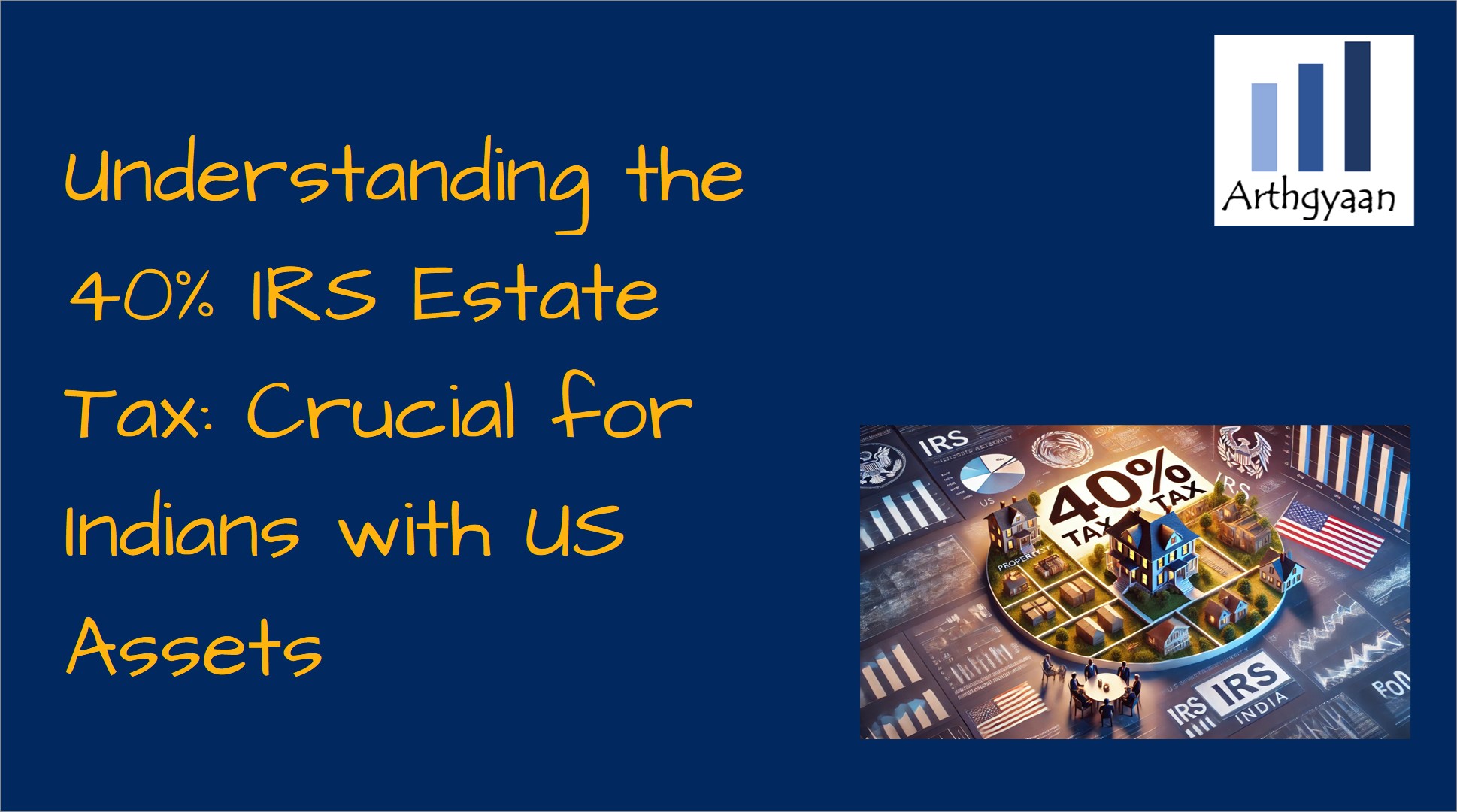Understanding the 40% IRS Estate Tax for Resident Indians and Returning NRIs
This article explains the concept of US Estate taxes that might take out a large chunk of the portfolio of Indian and NRI investors due to tax on their US-based assets.
This article explains the concept of US Estate taxes that might take out a large chunk of the portfolio of Indian and NRI investors due to tax on their US-based assets.

The US income tax statutory body, the Internal Revenue Service (IRS), taxes 40% of the assets (called estate) of anyone holding US assets when they die. What this simplistically means is that:
Important: The Estate Tax rate is graduated (i.e. the tax rates increase with increasing estate amounts just like normal income tax) with 40% being the highest level.
The threshold above which the 40% tax is triggered depends on the residency status:
40% tax is levied above this threshold amount.
Estate tax for USC or Green Card holder = 40% of (Estate value - $15.0 million in 2026)
Estate tax for NRA = 40% of (Estate value - $60,000)
The value of the asset or account at the time of death is used to calculate estate tax. The tax is not applicable if the Estate Value minus Threshold is a negative number.
Situs means the place to which, for purposes of legal jurisdiction or taxation, a property belongs.
The 40% IRS Estate Tax rule applies to US-situs assets.
Some examples are:
Note: Ordinary US bank accounts, not connected to a company or business, are not a US-situs asset for estate tax purposes.
The approximate calculation, given the graduated nature of the tax rates, looks like this for amounts above the threshold:
How to use the US Federal Estate Tax Calculator?
The calculator requires you to enter your total value of US-situs assets and your tax residency status:
Now click the Calculate Tax button to get the result.
1.00 Cr
If you are a resident Indian, the 40% IRS Estate Tax rule applies to you if you have purchased assets like stocks (NVDA, TSLA, GOOG, AAPL etc.) or ETFs (VT, VTI, VOO etc.) or mutual funds in the US. These assets fulfil the US-situs rule. Here it is also important to understand the nuance of domicile vs residency.
Domicile status depends on factors such as the amount of time spent in the US vs elsewhere, intentions regarding staying in the US vs leaving and other factors.
| Threshold | U.S. Citizen | Resident Indian / NRA |
|---|---|---|
| U.S. Domiciliary | $15.0 mn | $15.0 mn |
| Non-U.S. Domiciliary | $15.0 mn | $60,000 |
For example, you hold ₹1 crore in a US-traded stock / ETF portfolio you purchased using RBI’s Liberalised Remittance Scheme (LRS).
Assuming the $/₹ rate is 85, $60,000 = ₹51 lakhs. The estate tax is applicable on ₹1 crore - ₹51 lakhs = ₹49 lakhs.
If you die today, your heirs will pay estate tax on this ₹49 lakhs when the shares are transferred to them.
Non-US domiciled funds (e.g. UCITs and SICAV-type funds) are not covered by this IRS Estate Tax rule.
For erstwhile NRIs, who are no longer living in the US, the threshold of the 40% IRS Estate Tax rule depends on the visa/residency status:
Here the same logic applies to NRIs planning to return depending on their residency status at the time of death - unless you hold a Green Card or US citizen status, every dollar of assets above $60,000 will be subject to 40% estate tax.
1. Email me with any questions.
2. Use our goal-based investing template to prepare a financial plan for yourself.Don't forget to share this article on WhatsApp or Twitter or post this to Facebook.
Discuss this post with us via Facebook or get regular bite-sized updates on Twitter.
More posts...Disclaimer: Content on this site is for educational purpose only and is not financial advice. Nothing on this site should be construed as an offer or recommendation to buy/sell any financial product or service. Please consult a registered investment advisor before making any investments.
This post titled Understanding the 40% IRS Estate Tax for Resident Indians and Returning NRIs first appeared on 28 Aug 2024 at https://arthgyaan.com